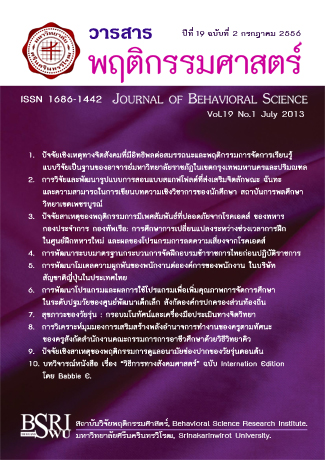ปัจจัยสาเหตุของพฤติกรรมการมีเพศสัมพันธ์ที่ปลอดภัยจากโรคเอดส์ ของทหารกองประจำการ กองทัพเรือ: การศึกษาการเปลี่ยนแปลงระหว่างช่วงเวลาการฝึก ในศูนย์ฝึกทหารใหม่ และผลของโปรแกรมการลดความเสี่ยงจากโรคเอดส์
Abstract
Causal Factors of HIV/AIDS Safe Sex Behavior among Thai Navy Conscripts: The Study of Change during Training in the Recruitment Center and Effects of AIDS Risk Reduction Program
Abstract
The main objectives of this study were: 1) to study the change of causal factors and HIV/AIDS safe sex behavior among Thai navy conscripts during training in the recruitment center;
2) to study the effects of AIDS risk reduction program, 3) to study the relationship of causal factors and safe sex behavior, and 4) to compare the change of safe sex behavior between the experimental and the control group. This research was designed to be the parallel quantitative method which includes two quantitative studies. First study: the longitudinal study with four-time-measures from 228 samples. Second study: the experimental study with completely randomized one-factored with pretest post test and follow-up design, the samples were the experimental and control group with 22 conscripts each. Independent variable contains. Risk: characteristics of sexual partners, sexual sensation seeking, optimistic bias and safe sex self-efficacy. Dependent variable is HIV/AIDS safe sex behavior. The research results were as follows. During training in the recruitment center, safe sex behavior and risk characteristics of sexual partner were decreasing while optimistic bias was increasing. The result of experimental program found that the conscripts who participated in AIDS risk reduction program were higher in safe sex behavior than conscripts who did not participate in this program. It was also found that the effects of program in reduced optimistic bias encouraged higher safe sex behavior significantly in the second-time-measure (b=-.45, p.<0.05). During training, experimental group were higher in safe sex behavior significantly than control group (Mean slope of latent variable =2.01, p<0.05) while have no change among the control group.
Key words: Safe sex behavior, Optimistic bias, Conscript, AIDS risk reduction model
บทคัดย่อ
การวิจัยนี้มีวัตถุประสงค์เพื่อ1) ศึกษาการเปลี่ยนแปลงปัจจัยสาเหตุและพฤติกรรมการมีเพศ สัมพันธ์ที่ปลอดภัย จากการติดเชื้อโรคเอดส์ของทหารกองประจำการกองทัพเรือ ระหว่างช่วงเวลาการฝึกทหารใหม่ 2) ศึกษาผลของโปรแกรม การลดความเสี่ยงจากการติดเชื้อโรคเอดส์ 3) ศึกษาความสัมพันธ์ เชิงสาเหตุกับพฤติกรรมการมีเพศสัมพันธ์ที่ปลอดภัยที่วัดเหลื่อมเวลากัน 4) เปรียบเทียบการเปลี่ยน แปลงของพฤติกรรมการมีเพศสัมพันธ์ที่ปลอดภัยระหว่างกลุ่มทดลองและ กลุ่มควบคุม งานวิจัยนี้ใช้แบบแผนการวิจัยเชิงปริมาณคู่ขนาน แบบแผนแรกเป็นการวิจัยระยะยาวที่มีการเก็บข้อมูลซ้ำ 4 ครั้ง จำนวน 288 คน ส่วนแบบแผนที่สอง เป็นการวิจัยเชิงทดลองที่มีการวัดก่อน, หลัง, ระยะติดตาม 2 ครั้ง จำนวน 22 คน ในแต่ละกลุ่มทดลองและควบคุม ตัวแปรสาเหตุได้แก่ ลักษณะเสี่ยงของคู่นอนทางเพศ การแสวง หาความท้าทายทางเพศ การรับรู้ ความเสี่ยงอย่างลำเอียงในแง่ดี การรับรู้ความสามารถของตนเองในการมีเพศสัมพันธ์ที่ปลอดภัย ส่วนตัวแปรผลคือพฤติกรรมการมีเพศสัมพันธ์ที่ปลอดภัยจากโรคเอดส์ ผลการวิจัยพบว่าระหว่างช่วงการฝึก 2 เดือน ทหารกองประจำการมีลักษณะเสี่ยงของคู่นอนทางเพศลดลง แต่มีการรับรู้ความเสี่ยงอย่างลำเอียงในแง่ดีเพิ่มขึ้น และมีพฤติกรรมการมีเพศสัมพันธ์ที่ปลอดภัยลดลง ผลการทดลองพบว่าทหารที่เข้าร่วมโปรแกรม มีการรับรู้ ความเสี่ยงอย่างมองโลกในแง่ดีต่ำกว่า มีการรับรู้ความสามารถของตนเองและมีพฤติกรรมการมีเพศสัมพันธ์ที่ปลอดภัยสูงกว่าทหารที่ไม่ได้เข้าร่วมโปรแกรม ผลของโปรแกรมที่ช่วยลดการรับรู้ความเสี่ยงอย่างลำเอียงในแง่ดีจากการวัดครั้งที่ 2 ช่วยเพิ่มพฤติกรรมการมีเพศสัมพันธ์ที่ปลอดภัยอย่างมีนัยสำคัญ (b=-.45, p.<0.05) ในช่วงเวลาของการฝึกทหารที่เข้าร่วมโปรแกรมมีพฤติกรรมการมีเพศสัมพันธ์ที่ปลอดภัยเพิ่มขึ้นอย่างมีนัยสำคัญ (ค่าเฉลี่ยตัวแปรแฝงการเปลี่ยนแปลง=2.01, p<0.05) ในขณะที่ทหารที่ไม่ได้เข้าร่วมโปรแกรมมีพฤติกรรม ไม่มีการเปลี่ยนแปลง
คำสำคัญ: พฤติกรรมการมีเพศสัมพันธ์ที่ปลอดภัยจากโรคเอดส์ การรับรู้ความเสี่ยงอย่างลำเอียงในแง่ดี ทหารกองประจำการแบบจำลองการลดความเสี่ยงจากโรคเอดส์
Downloads
Downloads
Published
How to Cite
Issue
Section
License
Behavioral Science Research Institute, SWU
114 Sukhumvit 23, Bangkok 10110, Thailand.
Tel.02-649-5000 # 17600



